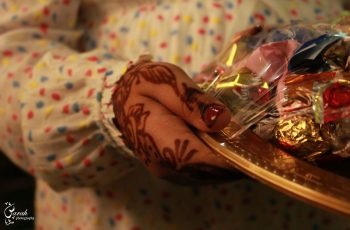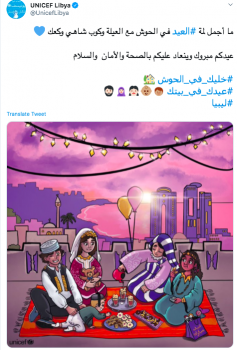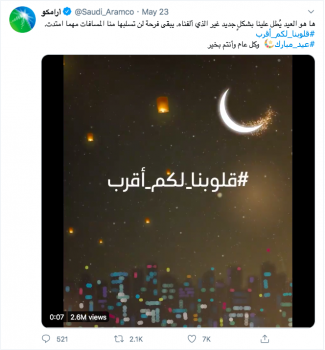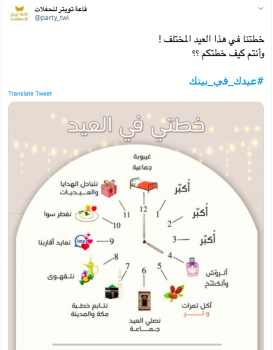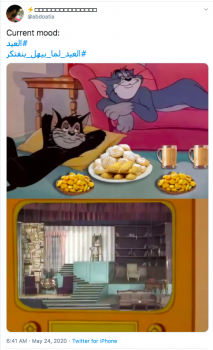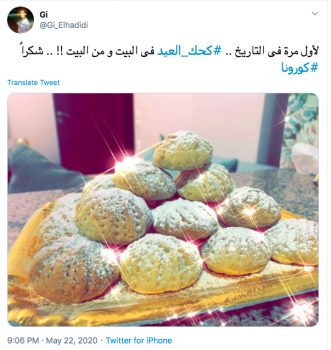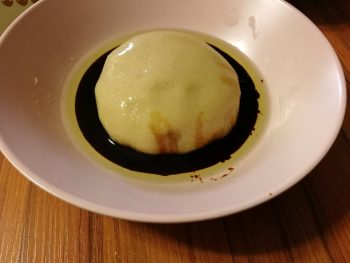Eid Under lockdown العيد خلال الحظر Posted by Hanan Ben Nafa on May 26, 2020 in Arabic Language, Culture, Vocabulary
Today’s post is a quick report of what has been going on in social media during Eid and how Arabs expressed their feelings عبّروا عن مشاعرهم and reactions ردّات فعلهم towards spending Eid under very different circumstances تجاه قضاء العيد في ظروف مختلفة than most years! The post includes some of the hashtags وسوم that were created this year, people’s ideas for managing to stay positive البقاء إيجابيين and photos of traditional homemade sweets حلويات تقليدية مصنوعة في المنزل .
> I would like to start with three popular phrases (in spoken Arabic) that people say to each other during Eid.
يِنْعَاد عَلِيكُم، بالصحة والعافية
(May it’s repeated for you/ you witness it again, with health and wellbeing)
*It: refers to Eid.
The other one is:
إن شاء الله كل عام وإنتو سالمين
(Inshallah every year, you’re well/protected)
*This phrase is dominantly used in the Levant region.
And this one:
إن شاء الله من العايدين والفايزين
(Inshallah you will be among those repeaters and winners).
*Repeaters: to witness Eid again.
= = = = = = = =
>> Now, let’s have a look at the most popular hashtag on Twitter this year.
I noticed two hashtags in Arabic that were included in most posts, these are:
Your Eid in your house
Happy Eid 2020
For example, you can see the first hashtag appears in the post below by “UNICEF Libya” account. The photo included is designed by a Libyan artist, featuring people تُظهر أشخاصِا dressed up in يرتدون their traditional clothes ملابسهم التقليدية.
*Translation of what’s in the post: “How beautiful Eid gathering is, at home with family, and a cup of tea and biscuits1The word originally used is “Kaʕk”, which is a type of traditional, homemade Arabic sweets, close in their texture to biscuits..
Have a blessed Eid, and may it’s repeated for you with health, security and peace”.
There was also another hashtag created by Aramco, the Saudi oil company شركة النفط السعودية and that is:
Our hearts are closer to you
The hashtag appeared in a short video clip posted by the company’s account.
*Translation of what’s in the post: “Here’s Eid coming in a different form from that which we’re used to. It will remain a joy that distances won’t rob us of, regardless of how much they protologue”.
= = = = = = = =
>>> Eid Plans خطط العيد
Since Eid is different this year, a Saudi tweep shared his/her plans for the day, using the photo below, titled: My plan in Eid.
The post says: ‘Our plan in this different Eid. And what are your plans?”.
The writing on the photo is in the Saudi dialect and reads as:
Collective coma2A sarcastic reference to how most Muslims can’t wake up early on Eid, because they’re used to staying up late during Ramadan. غيبوبة جماعية
We say “Allah-u Akbar” أكبّر
I have a shower and dress up أتروّش وأتكشّخ
I eat dates (odd number)آكل تمرات – وتر
We pray Eid نصلّي العيد
We follow Khutba3A religious speech in Islam, before Eid/Jumʕa prayer. in Mecca and Medina نتابع خطبة مكة والمدينة
We have coffee نتقهوى
We exchange greetings with our relatives نعايد أقاربنا
We have breakfast together نفطر سوا
We exchange gifts and Eid money نتبادل الهدايا والعيديّات
= = = = = = = =
>>> And then there are also posts where people feel nostalgic about (old) Eid rituals they used to practice when they were younger or during Eid in general!
For example, the post below shows two cats having Eid sweets حلويات العيد, tea and watching what seems to be the first scene of an iconic Egyptian comedy play العيال كبرت (The kids have grown up) that many Arab got in the habit of watching during long Eid days.
The hashtags included in the post are:
Eid
When Eid comes, we remember
= = = = = = = =
>>>>> And finally, there are posts that included photos of traditional food and sweets Arabs make/eat during Eid.
In Egypt, for example, there’s the hashtag of:
Eid’s Kak (traditional biscuits)
Almost all Arabic countries have their own traditional version of Kaʕk الكعك but here is a photo of the one people make in Egypt where it’s called KaHk كحك.
*Translation of what’s in the post: “For the first time in history: Eid’s kaak (made) at home, and from home. Thank you, Corona”.
= = = = = = = =
And before I finish the post, here is a photos of traditional Libyan porridge عصيدة (with olive oil and date syrup شراب التمر الرُّبّْ) that Libyan are used to eat first thing in the morning, on the first day of Eid.
= = = = = = = =
See you soon, in another Arabic blog 🙂
- 1The word originally used is “Kaʕk”, which is a type of traditional, homemade Arabic sweets, close in their texture to biscuits.
- 2A sarcastic reference to how most Muslims can’t wake up early on Eid, because they’re used to staying up late during Ramadan.
- 3A religious speech in Islam, before Eid/Jumʕa prayer.

Build vocabulary, practice pronunciation, and more with Transparent Language Online. Available anytime, anywhere, on any device.



